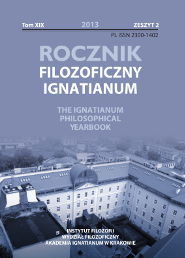The Family and its Ethos. A Philosophical Case Study in Ontologico-Historical Understanding
Abstract
This paper attempts an investigation of the system of references and interdependencies linking historical and ontological concerns to one another in the context of family life as we know it today. The results are examined with a view to establishing their implications for some broader issues pertaining to post-Heideggerian phenomenology, critical social theory (Adorno), and post-Wittgensteinian philosophy of language. Finally, the distinctive form of intelligibility presented here is compared to the conception of ethos presented in Aristotle’s account of rhetorical practice.
References
Adorno TW (1973), "Negative Dialectics" London Routledge and Kegan Paul.
Aristotle (1991), "The Art of Rhetoric" Harmondsworth Penguin Books Ltd.
Cerezo M (2005), "The Possibility of Language. Internal Tensions in Wittgenstein’s Tractatus" Stanford Center for the Study of Language and Information.
Hanna P and Harrison B (2004), "Word and World. Practice and the Foundations of Language" Cambridge, UK Cambridge University Press.
Heidegger M (1991), "The Principle of Reason" Indianapolis Indiana University Press.
Heidegger M (1962), "Being and Time" London SCM Press.
Kripke S (1972), "Naming and Necessity", In Semantics of Natural Language. Dordrecht , pp. 253-355, 763-769. D. Reidel.
Von Wright GH (1984), "Diachronic and Synchronic Modality", In Truth, Knowledge, and Modality: Philosophical Papers. Oxford Vol. 3 Blackwell.
Wittgenstein L (1969), "On Certainty" Oxford Blackwell.
Wittgenstein L (1953), "Philosophical Investigations" Oxford Blackwell.
(2011), "Art of Philosophy. A Selection of Jerzy Perzanowski's Works" Frankfurt Ontos Verlag.
The Yearbook only accepts materials for publication that are free of all conflicts of interest, and that in no way involve conflicts over authorship, copyright, etc. The Editors will take action against any cases of plagiarizing, ghostwriting1, guest/honorary authorship2, etc. Where co-authored work is concerned, the Author listed first is expected to take responsibility for the submission, and is required to make clear the contributions of all of the Co-Authors involved. In the event of the publication owing its existence to funding dedicated to this purpose, this fact should be made clear: e.g. in any note of thanks/acknowledgement, or in a footnote, etc. Explicit notification should be given of any form of reprinting, with the appropriate evidence of permission to publish being furnished as required. Any impropriety on the part of Authors/Reviewers risks exposing them to appropriate responses from the relevant institutions.
______
1 This term refers to instances of a person who has made an essential contribution being omitted from the list of authors, or from notes conveying gratitude and/or acknowledgement.
2 This occurs when a person who has made either an insignificant contribution or no contribution at all nevertheless appears on the list of authors.





